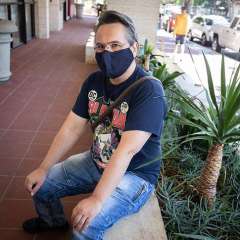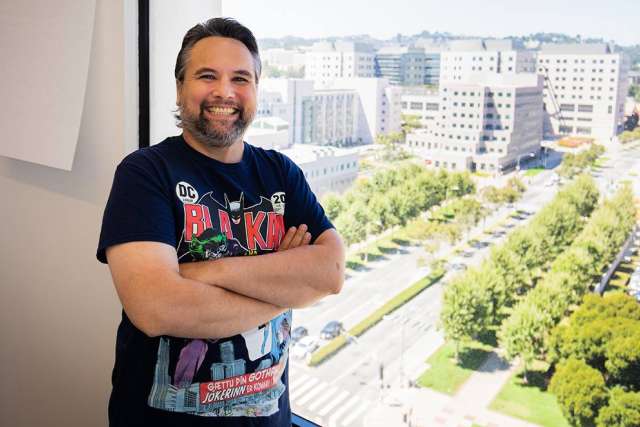Petur Leosson had been dealing with health issues for some time, but the resident of Iceland became particularly concerned when he noticed a growth in his mouth while looking at his reflection in a mirror.
It was a moment he’s not likely to forget – and one that launched him on a 4,000-mile journey to Ronald Reagan UCLA Medical Center.
“I’ve been suffering from chronic coughing for almost 10 years now,” says Leosson, who first went to his local physician about the ailment in 2017. “Fast forward to this year, in January. I started to notice a growth on my right tonsil. When I opened my mouth, I could see it in the mirror.”
At that point, Leosson sought out a head and neck physician from his hometown, who thought the growth was an infection. But after a course of antibiotics, the growth had not diminished; instead, it had grown.
“By this time, I was starting to suspect it was cancer,” says Leosson, 46. “I was combing the Internet to find out anything and everything I could.”
When Leosson returned to his physician, the doctor ordered X-rays. The diagnosis was as he feared: cancer.
“In Iceland, the only treatment is radiation and chemotherapy, with a 50% reoccurrence rate,” he says. “The Icelandic experts I interviewed predicted that after the treatment I would suffer from severe swallowing dysfunction, long-lasting soreness, tooth and gum decay, hearing impairment, and other side effects like increased persistent attention deficiency. Basically, your chance of having any quality of life is down the toilet.”

Leosson, an editor, graphic designer and Batman comic translator, researched alternative treatments. After rejecting a British surgeon whose treatment was similar to that of his doctors in Iceland, he discovered the UCLA Health Head and Neck Cancer Program.
He was stunned: “I found out 95% of patients suffer no reoccurrence after surgery and have hardly any of the horrific side effects.”
Leosson’s next step was contacting UCLA Health about being an international patient. His contact was Melvie Dela Cruz, the nurse case manager for International Services.
“First, we get the inquiry and then we go through getting a patient’s medical records, history, X-rays, any information needed to present their case,” Dela Cruz says. “In Petur’s case, his tumor had metastasized to the neck area. He was told by his physicians in Iceland that it was too close to the artery and surgery would be too much of a risk for his life.”
The UCLA Head and Neck Cancer Program uses cutting-edge TransOral Robotic Surgery, a minimally invasive technique to remove benign and malignant tumors of the mouth and throat.
“I had a telecommunication meeting with my surgeon at UCLA Head and Neck Surgery, where I had the chance to play devil’s advocate and voice all the concerns to my doctors,” says Leosson. “I asked about the tumor being too close to the artery, and he said something to the effect that a tumor in the tonsil is always this close to the artery, and that performing this surgery was what he does every day. So traveling here was a no-brainer for me.”
Once Leosson decided to come to Los Angeles, he and Dela Cruz worked together to figure out how to travel during the pandemic. “To be honest, if you’re suffering from a cancer tumor in your tonsils, COVID is the least of your problems,” Leosson says. “If the cancer spread to my lungs it would be game over, so delaying cancer treatment because of COVID would have been the absolute worst thing I could have done.”
Besides, he says, at UCLA Health, “The hospital workers follow COVID protocols that are far more strict than anything I've seen in my home country.”
The American ambassador in Iceland played a key role in helping to secure the emergency visa.
“It took Petur’s medical records and a letter from his UCLA Health surgeon, but he got the emergency medical visa from the embassy,” Dela Cruz says. “We encouraged him to get COVID testing done before he came to lessen the quarantine time when he arrived.”
Leosson recalled the next steps.
“I booked my flight as soon as they told me I had my visa, but the system automatically cancelled the flight (due to travel restrictions in the Schengen Area due to COVID-19). The consulate was excellent in helping me get my flight, and giving me printouts for when I landed in the U.S. Because I had a chronic cough, I was coughing as I traveled and people were giving me the eye, but because I knew it was caused by the tumor, it didn’t bother me. When I landed in the United States, immigration stopped me and I missed my connection flight to Los Angeles. It took time, but it feels like such a small thing. I was so grateful that I managed to get this far.”
When Leosson arrived at UCLA Health, he was greeted by Dela Cruz and the International Services team, who briefed him on his schedule. “In Icelandic, we have a saying, Mér líður eins og blóm í eggi, which means I feel like a flower in an egg,” Leosson says. “It very much felt like I was a newborn baby being taken care of.”
Dela Cruz called Leosson every day while he was in the hospital. “There are no visitors allowed right now, but I wanted to make sure he was doing well. When he goes back to his home country I will continue to facilitate his well-being. I think it’s really rewarding to help a person you don’t know, then meet them and watch them recover before they go back to their home country having had a great experience."
The team briefed Leosson on everything to expect, so he had no medical surprises or unexpected effects after surgery.
“The biggest surprise was that they managed to remove the tumor without leaving any cancer behind,” he says.
“It’s been incredible. Everything went exactly as planned, the care team was beyond my wildest expectations, and I’m blown away. I feel incredibly blessed to have undergone treatment here at UCLA Health.”



